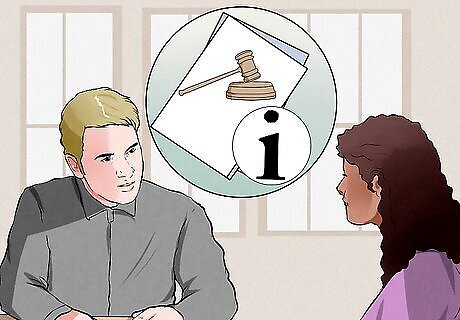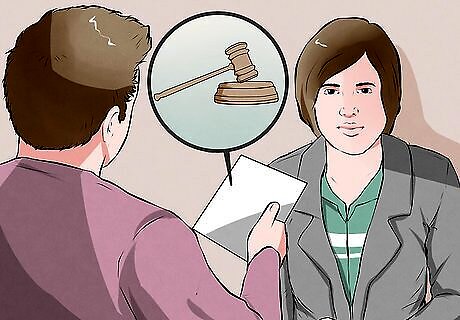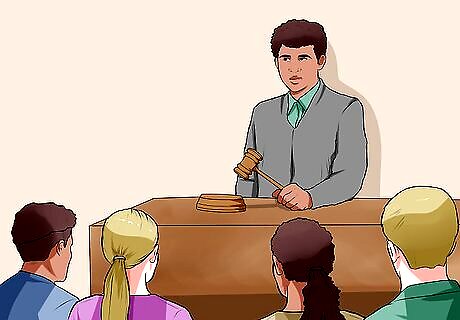
views
X
Research source
[2]
X
Research source
Hiring an Attorney

Conduct your initial search. A good place to start your search is to visit the website of your state or local bar association. Typically you can use their directories to find personal injury attorneys in your area, and you also can confirm that any attorney you consider is licensed and in good standing. Since personal injury attorneys typically work under contingency fee agreements, you shouldn't have to worry about money to pay attorney's fees up front. If you know anyone who's recently been involved in a personal injury case, you might ask them for a recommendation – but keep in mind that a lawsuit for punitive damages is quite a bit different than a simple negligence case that resulted in a settlement. When you get a few names, check their websites and pay particular attention to any discussion of past cases the attorney has won. Look for attorneys who have experience and a proven track record of success in winning significant verdicts of punitive damages at jury trials. At the same time, if you're seeking punitive damages you probably want to avoid attorneys who focus on settlements. While it's true that the vast majority of civil cases settle out of court, punitive damages almost always are awarded as a result of a jury verdict after a trial.

Gather information about your case. If you intend to seek punitive damages, any attorney with whom you speak will need as much information about the incident as you have so they can evaluate the possibility of such an award and estimate your odds of success at trial. The attorneys you interview will not only need to consider whether punitive damages are even legally available for injuries or losses such as yours, but also to calculate possible amounts that could be awarded. Keep in mind that punitive damage awards are highly fact-dependent and can vary widely on a case-by-case basis. Before any attorney can paint you a reliable picture of possible outcomes for you at trial, he or she will need to have all the information you have about your case and the incident that led to your claim. From this, a strong attorney can determine what information is missing that is necessary to make a claim for punitive damages.

Interview several attorneys. Before you make your final choice, you should try to schedule initial consultations with at least three attorneys so you can compare and contrast to make an informed decision about who would best represent you. Since most personal injury attorneys offer free consultations, this shouldn't require much out-of-pocket investment – but it will take you some time to interview and evaluate several attorneys. Prepare for your interviews by making a list of questions you want to ask each attorney. The list can help you to focus if you get distracted in the attorney's office or are intimidated by your surroundings. Find out how many jury trials the attorney has handled, and ask for some examples of awards of punitive damages they've won for past clients. You also want to ask questions about the attorney's work style. Understanding the best ways to communicate with your attorney and how quickly they respond to phone calls or emails can give you an idea of what it would be like to be their client. When you evaluate each attorney, pay attention to your comfort level and how they interact with you and the other people working in an office. Don't be afraid to go with your gut and pass on an attorney who's perfect on paper but makes you feel uncomfortable or intimidated in person. You're going to be working intensely with this person for a year or more during the litigation of your case – how the attorney makes you feel can be just as important as their track record and level of expertise.

Sign your retainer agreement. Even though you probably will hire your attorney under a contingency fee arrangement, it's important to get the details of your representation in writing so there is no confusion later on. Your attorney should go through the agreement with you and make sure you understand all aspects of it before you sign it. If you have any questions, don't be afraid to ask. Your attorney would rather you understand the agreement than have a dispute later. The agreement should outline how the attorney will account for costs, what costs will come out of your award or settlement separately, and what percentage of your award or settlement the attorney will take as a fee. There also will be information in the agreement regarding the scope of the attorney's representation and the types of tasks he or she is being hired to complete on your behalf.
Initiating Your Lawsuit

Draft your complaint. Once you've hired your attorney, you'll work with him or her to draft the complaint, which is the document you must file with the court to initiate your lawsuit. Your complaint identifies yourself and the person or company you're suing and lists your factual allegations against them. The bulk of the complaint consists of numbered paragraphs, each of which contains a single factual statement. These paragraphs together outline the incident that occurred, the ways in which the defendant was responsible for your losses or injuries, and your legal theory as to why you are entitled to monetary damages as a result. You will make a demand in your complaint for both compensatory and punitive damages. Your attorney will need information about the expenses or losses you incurred so he or she can calculate your compensatory damages. The calculation of punitive damages will be based on a number of factors, including how reprehensible the defendant's conduct was and the amounts awarded to similar plaintiffs under similar circumstances.

File your complaint. After your complaint has been finalized, it must be filed with the clerk of the court in which you want your lawsuit to be heard. Although this is something your attorney typically will take care of, it can help for you to understand the process. Your attorney likely will take your complaint to the courthouse and give it to a clerk along with the filing fees – typically several hundred dollars – the court charges to initiate a lawsuit. The clerk will stamp the original documents and several copies "filed" with the date. One set of copies likely will be for your own records. Keep them in a safe place with the other documents you have related to the lawsuit or the incident that gave rise to it.

Have the defendant served. Since both parties in a lawsuit must have the opportunity to be heard, you must have a summons and your complaint officially delivered to the defendant so they know they're being sued and what they need to do to defend themselves. You typically only have a limited period of time after the documents are filed to have them served on the defendant. If your attorney is having difficulty serving the defendant, there are other steps that can be taken. One common method of service is to have the documents hand-delivered to the defendant by a sheriff's deputy. Private process-serving companies also may be used for defendants who are difficult to find or attempt to evade service. Some courts also allow service by sending the documents using certified mail with returned receipt requested. Once service is completed, there are proof of service documents that must be filed with the court to prove the defendant had notice of the lawsuit.

Receive the defendant's response. Once served with your lawsuit, the defendant has a limited period of time – typically less than 30 days – to file an answer or other motion in response to your complaint. If the defendant does not respond to your lawsuit by the deadline, you typically can file a motion for a default judgment. However, default judgments typically do not include awards of punitive damages. In any event, you shouldn't expect the defendant not to respond. On the contrary, you should expect to receive an answer that denies most, if not all, of your allegations and asserts a number of defenses. The defendant also may file a motion to dismiss your lawsuit. When this happens, you'll have to appear in court to prove to the judge that you have a legitimate claim under the law before you'll be allowed to proceed.
Litigating Your Case

Attend any pretrial hearings. If the defendant filed a motion in response to your complaint, such as a motion to dismiss, the court typically will hold a hearing on that motion before the pretrial litigation can properly begin. Keep in mind that judges typically refuse to entertain any additional pleadings or requests from a plaintiff until a motion to dismiss is decided – even though it may be months before a hearing can be scheduled. Apart from a motion to dismiss, pretrial litigation typically involves a number of procedural motions and scheduling conferences to keep litigation moving and get the judge's opinion on relatively minor issues that relate to the exchange and production of evidence and information. Typically your presence won't be required in court for hearings on technical or procedural matters. If you don't attend, your attorney will send you a letter summarizing the event, its outcome, and what it means in terms of your litigation strategy going forward.

Conduct written discovery. Through written discovery, you and the defendant will exchange information and documents related to the incident that gave rise to your lawsuit. This process can continue for months if not years, and will help you and your attorney flesh out your arguments and build your case against the defendant. Interrogatories are one aspect of written discovery. Both you and the defendant will create written questions for each other that must be answered in writing and under oath. When you're seeking punitive damages, your attorney likely will use interrogatories to learn about the defendant's state of mind and get the names and information of witnesses or other individuals who are likely to know something about the defendant's intent in behaving the way they did or committing the acts that led to your losses or injuries. Requests for production are another valuable discovery tool. You can ask the defendant to produce any documents or other evidence that is related to the incident that serves as the basis of your lawsuit, as well as any related policies or procedures.

Depose the defendant and any other witnesses. Depositions are another aspect of the pretrial discovery process, through which you have the opportunity to interview people under oath in the presence of a court reporter. During a deposition, the parties and their attorneys – along with whoever is being interviewed, if they are not a party to the case – meet with a court reporter, typically in a conference room at the law firm of the attorney holding the deposition. The attorney asks questions and the party or witness answers, and both the questions and answers are recorded by the court reporter, who produces a transcript for later use. Depositions are good for preserving testimony of witnesses, particularly since litigation can last months or even years, and memories can fade in the meantime. When you're seeking punitive damages, you want to use depositions to try to nail the defendant on their thoughts or motivation in acting in a way that caused your loss or injury.

Evaluate any settlement offers. Throughout litigation, expect the defendant to present several settlement offers. While your attorney is required to present these offers and offer advice, the decision of whether to accept a settlement offer ultimately is yours alone. The prospect of a jury trial likely will encourage the defendant to seek settlement, particularly if they aren't a very sympathetic individual or if you're suing a large corporation. Fault is a key part of an award of punitive damages – a jury is saying that the defendant behaved badly and should be punished for it. Particularly if you're suing a business, this sort of verdict can be especially damaging for the company's reputation as well as inspiring suits from others who were similarly injured. For these reasons, the defendant is going to do everything in their power to entice you to settle the lawsuit before trial. However, keep in mind that settlements typically are confidential, and may not include any admission of fault or wrongdoing. If you're seeking punitive damages for the principle of the thing, you may decide that it's worth it to stick to your guns, even if you don't ultimately win your lawsuit. At each stage of the process, your attorney should keep you well advised of your prospects at trial and the strengths and weaknesses of your case.

Participate in mediation. Many courts require litigants to at least attempt the mediation process before a trial can be scheduled. Through mediation, a neutral third party works with you and the defendant in an attempt to reach a settlement of the dispute. Just like a private settlement, the defendant will prefer reaching a settlement through negotiation because the outcome will be confidential. Likewise, don't expect punitive damages to be a part of any settlement reached through mediation. However, you may have more flexibility with mediation than you did with private negotiations to convince the defendant to take other actions that help eliminate the problems that caused your injury or loss – even if punitive damages aren't included. Keep in mind that even if the mediation process is mandated by the courts, reaching settlement is voluntary and never required. It's perfectly acceptable to bargain to an impasse – in which case you'll have to start preparing for trial.



















Comments
0 comment